Gov. Jerry Brown: Is he saving California or ruining it? The 9 big issues
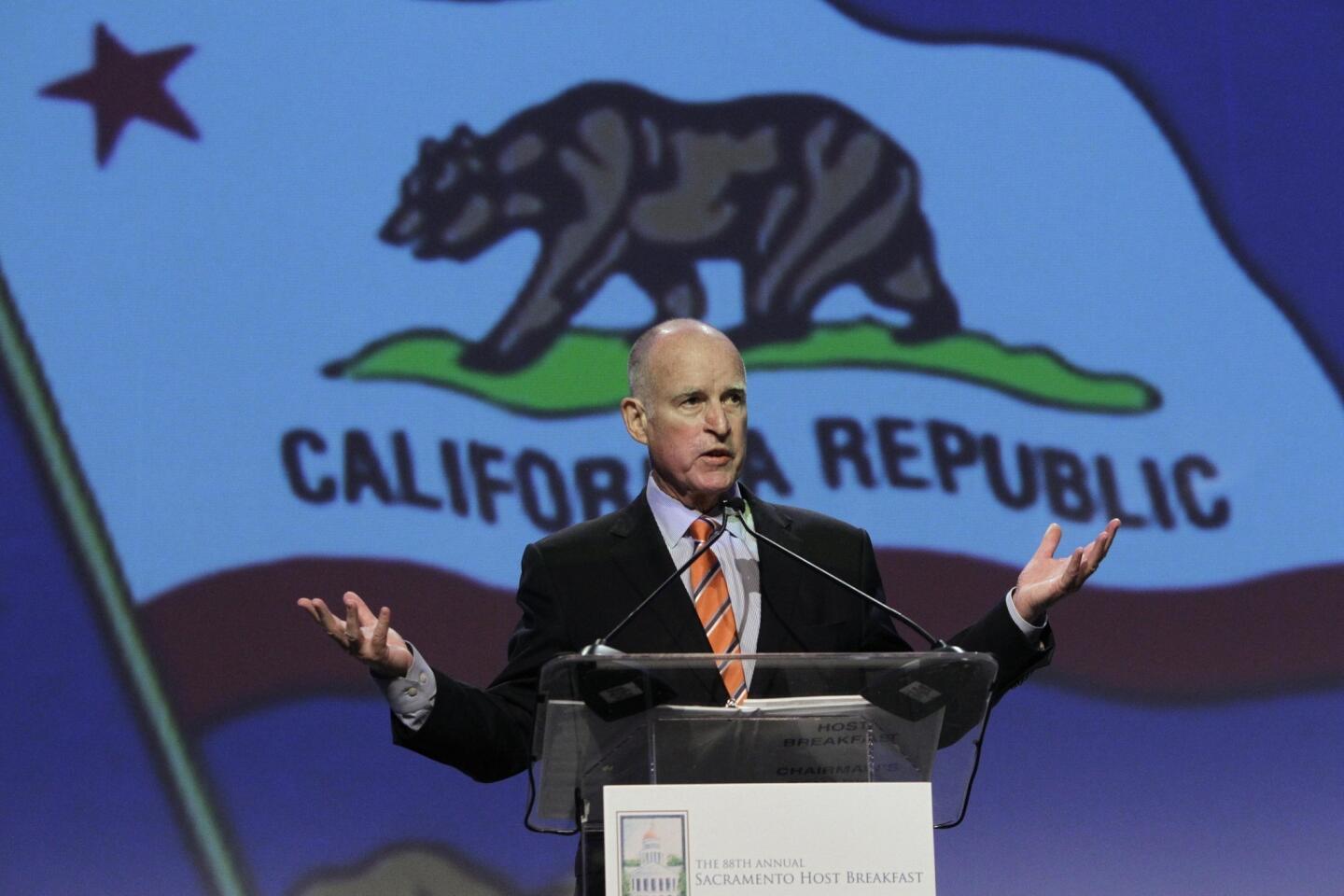
By Sara Lessley, guest blogger
In the final year of his third term as governor, Jerry Brown is riding high after a series of high-profile successes. Defying expectations, “Brown has faced down a massive state deficit, persuaded voters to approve new taxes and overhauled school finances and the state’s vast prison system,” declares the Christian Science Monitor.
“Brown is right to stay the course,” applauds The Times’ editorial board, by sticking with the “cautious practices that led the state safely to this point.”
“Now he is the most trusted, stable, and reliable leader around,” adds political scientist Bruce Cain in the Atlantic, about the man who was also California’s top pol from 1975 to 1983.
But Brown is not without his critics, and potential landmines.
Some excoriate his “think big and be bold” plans -- a bullet train (now ringing up at an estimated $68 billion) and water tunnels under the Sacramento delta ($25 billion and counting).
Others say the “kooky Left Coast Gov. Moonbeam” got lucky, taking office this time around in an upward economy and with the Democrats in charge in Sacramento. “Rich people can’t cross the state line fast enough,” they complain.
Well, says the 75-year-old Democrat: “I’ve been down, and I’ve been up. And I’d much prefer to be up.”
Here’s a look at some of Brown’s astute accomplishments -- plus his, well, perhaps pie-in-the-sky dreams.
Sara Lessley is a freelance journalist and editing coach in Los Angeles. (Rich Pedroncelli / Associated Press )
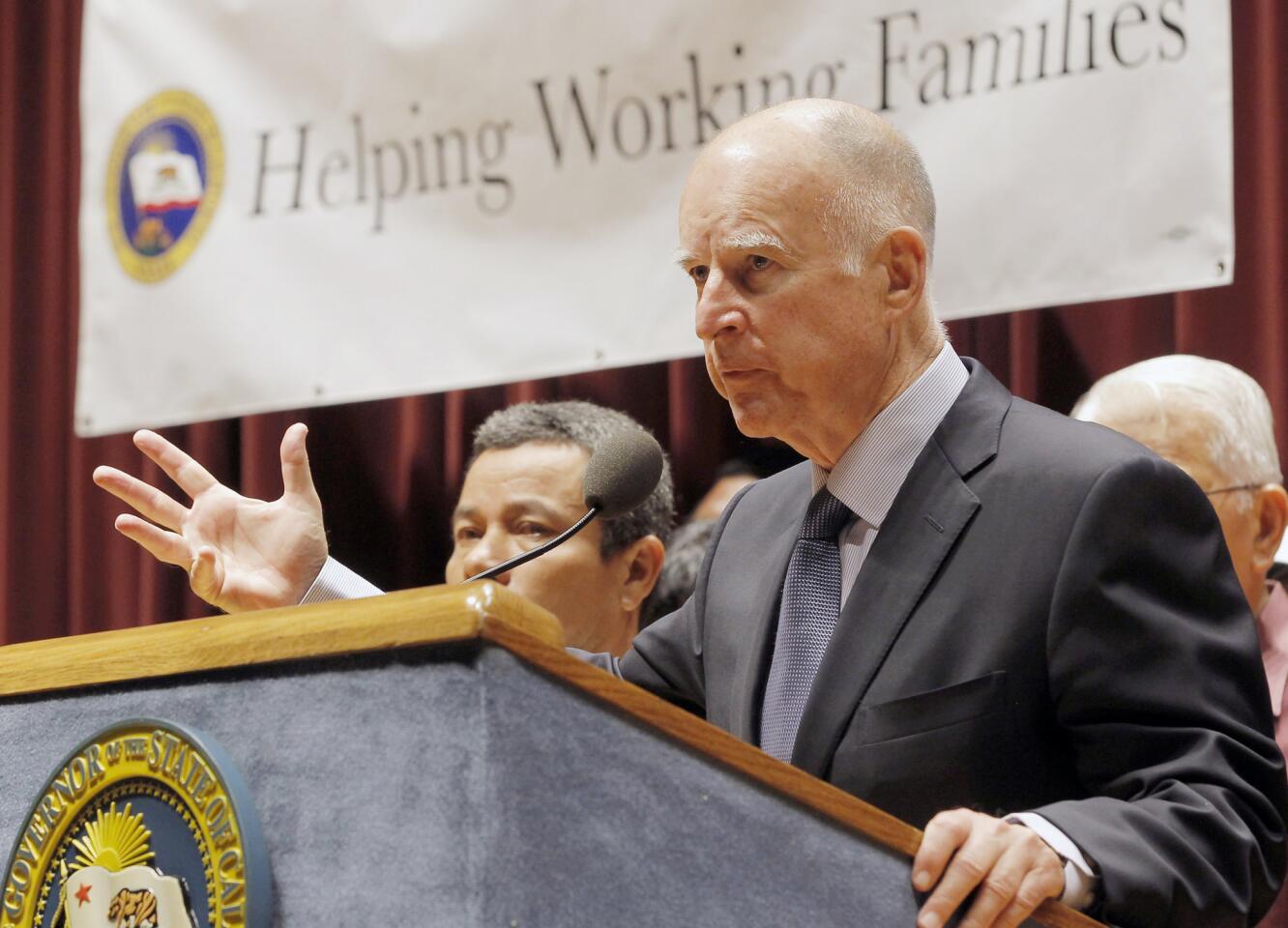
Calling it a “matter of justice,” Gov. Jerry Brown signed a bill last year to hike the state’s minimum wage to $10 an hour within three years.
The legislation -- which comes amid a national conversation over whether it’s fair to pay fast-food workers and clerks so little that they need a second job -- will raise the minimum wage from $8 an hour to $9 in 2014 and then to $10 on Jan. 1, 2016.
Brown dubbed the action long overdue: “The minimum wage has not kept pace with rising costs.” This wage hike should close the gap between “workers at the bottom and those who occupy the commanding heights of the economy.” (Nick Ut / Associated Press)
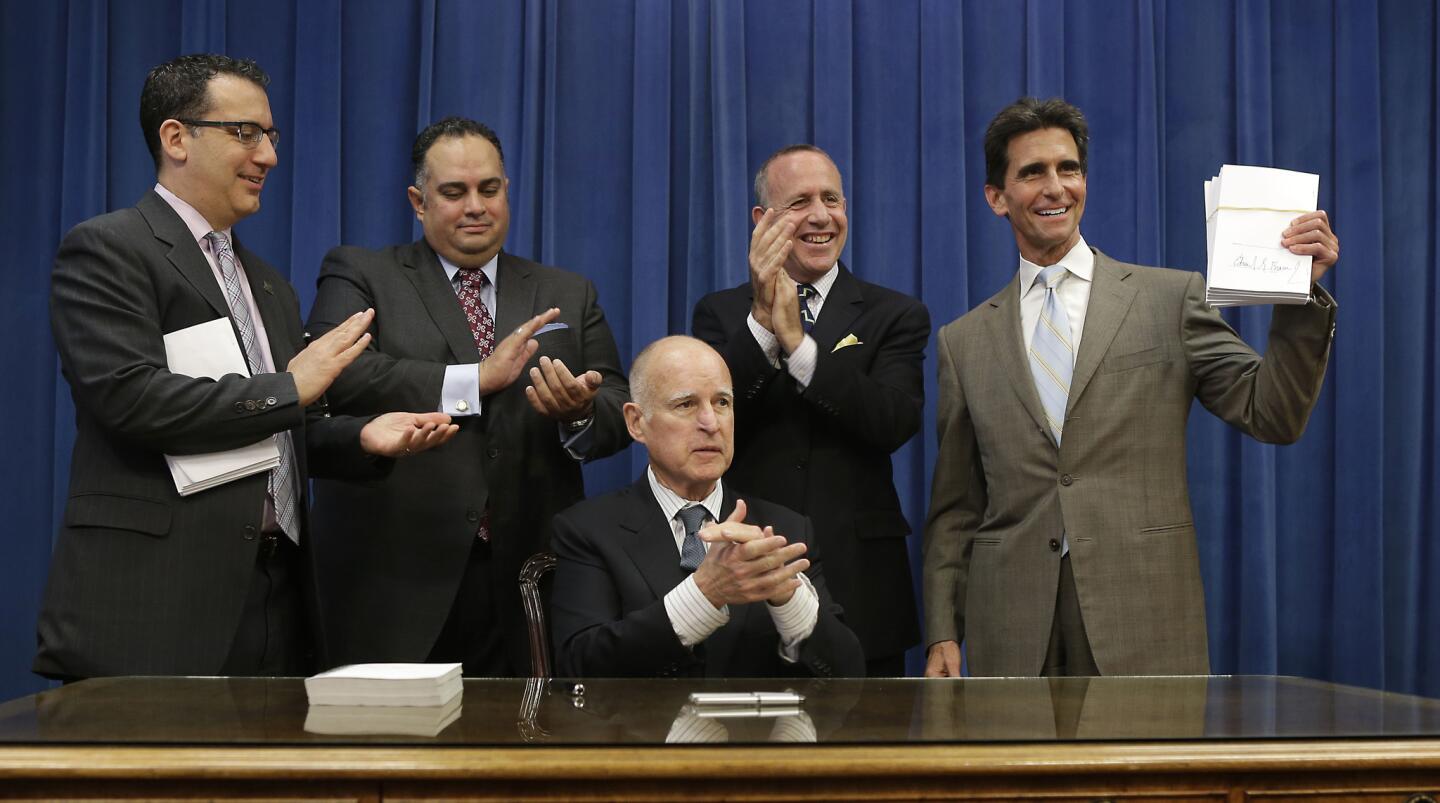
Gov. Jerry Brown hasn’t done it alone, by a long shot.
He had the “good fortune to take office as the national economy was beginning to rebound and after voters approved an initiative allowing the state budget to pass with a majority vote in the Legislature rather than a two-thirds supermajority,” according to the Associated Press.
And with the Democrats controlling the Legislature, the political gridlock loosened.
“Things happen in California that are not happening in Washington,” Brown now says. “We can do a lot of things in California to shift the [political] climate throughout the whole country.”
His critics are more skeptical, pointing to the “crushing load of debt” the state still carries. (Rich Pedroncelli / Associated Press)
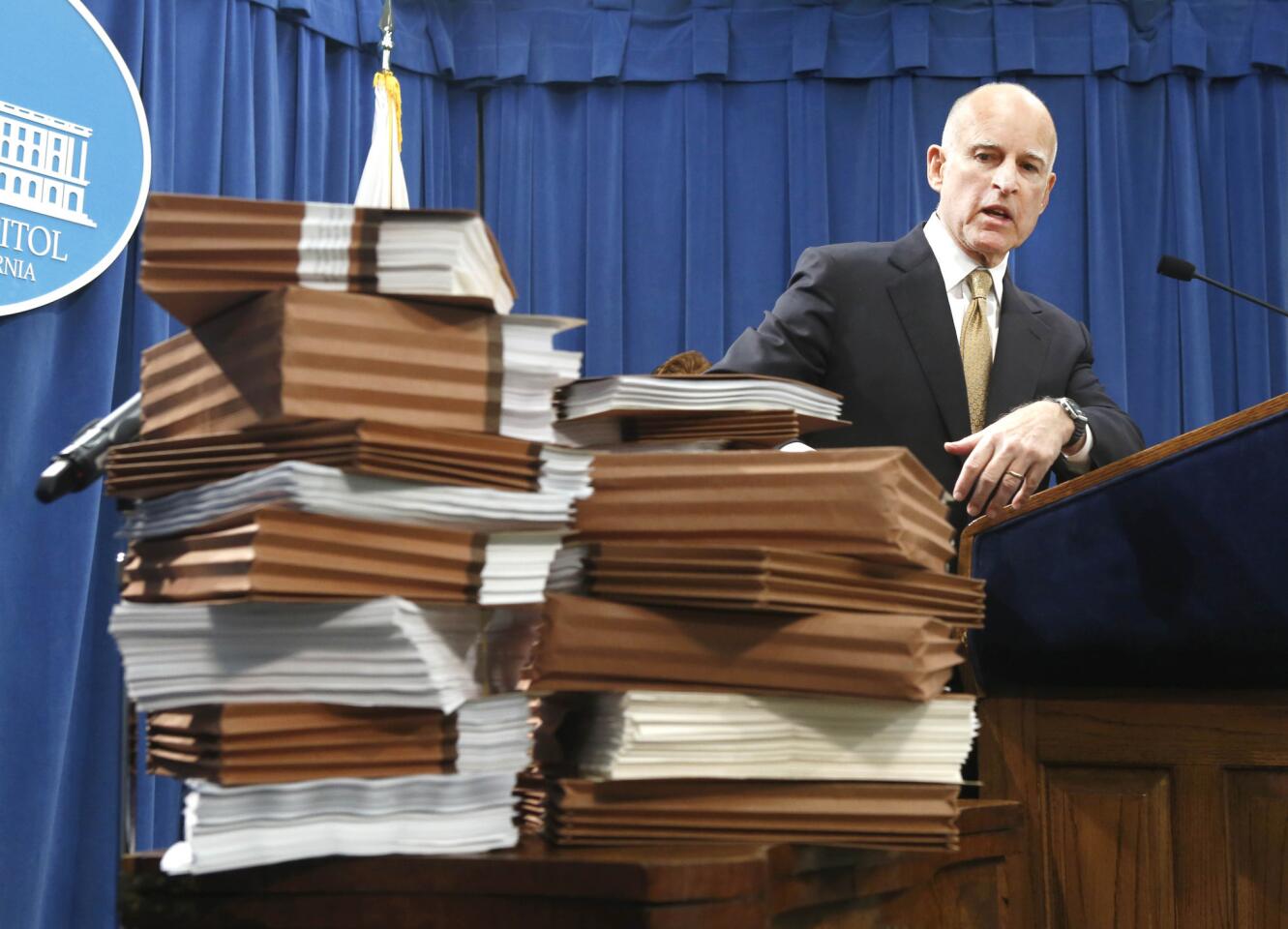
OK, the situation in California’s prisons, says Gov. Jerry Brown, isn’t ideal, but it’s “far less of a mess than it had been in years before.”
Prodded by the courts to do something yesterday about the state’s crammed lockups, Brown’s answer was so-called prison realignment.
Transferring responsibility for lower-level drug offenders and thieves from the state to the counties was praised (it could save money and reduce recidivism) and panned (it might lead to far less time behind bars or in the parole office for many criminals).
“This is a bold vision of a different relationship between the state and local government,” explains Brown. “It’s bold, it’s difficult and it will continuously change as we learn from experience. But we can’t sit still and let the courts release 30,000 serious prisoners ... this is the most viable plan that I have been able to put together.”
Still, it’s a work in progress. Brown is “counting on federal judges to grant him an additional two years to hit the target,” The Times says, for the court-ordered inmate limits. (Rich Pedroncelli / Associated Press)
Advertisement
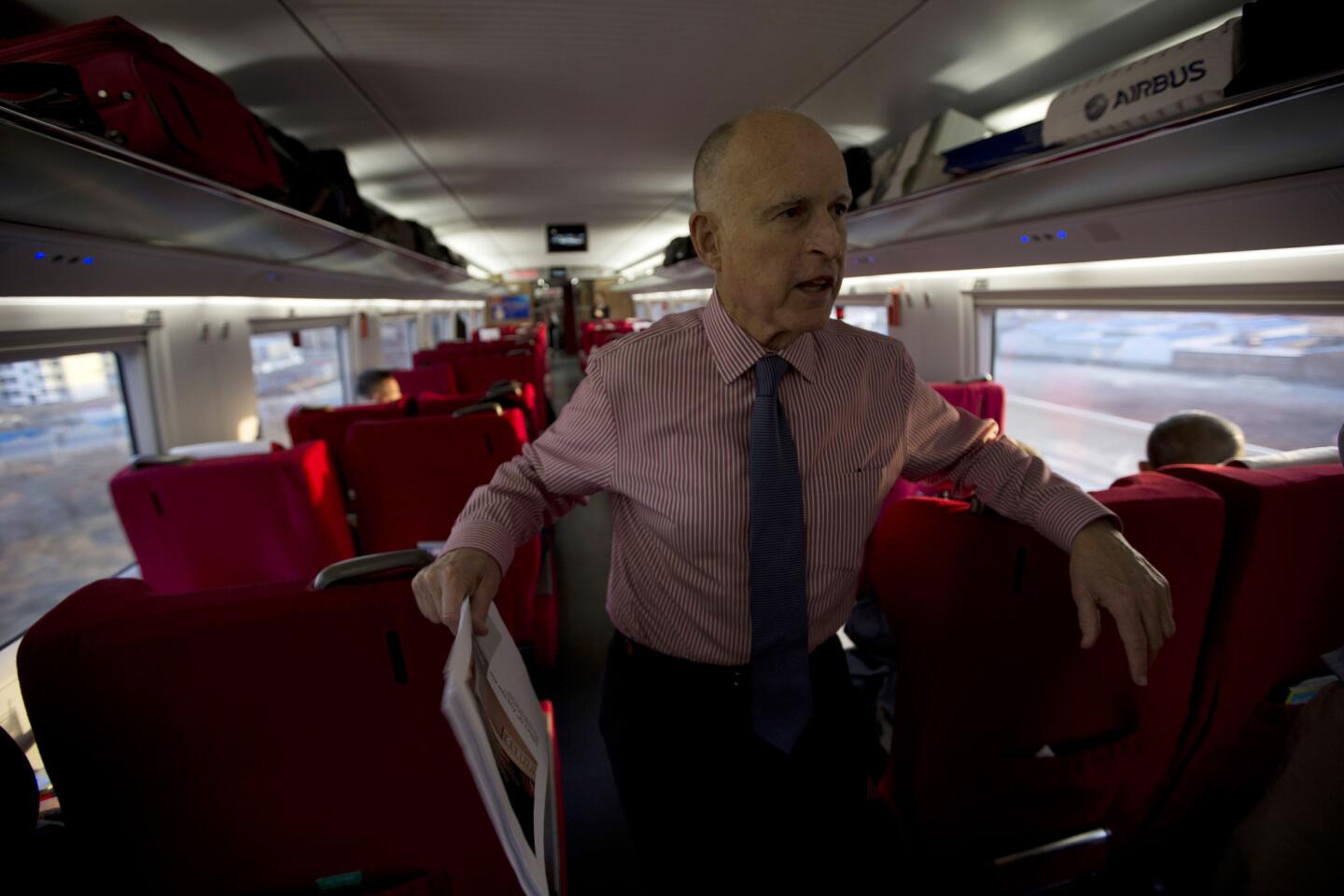
The governor dreams of a high-speed rail line between the north and south of the state, an ambitious plan that’s losing public support as its budget balloons.
Brown sees a “high-speed railway as an environmentally friendly alternative to air or automobile travel,” The Times wrote, but he’s been dealt a number of legal setbacks.
And the mood has changed.
In 2008, California voters firmly backed the sale of $10 billion in bonds for the bullet train. But now courts have questioned the construction and financing plan for the $68-billion project.
In the Central Valley, some are posting signs: “Here comes high-speed rail. There goes the farm.”
His latest effort? Brown hopes to use corporate fees on greenhouse gases -- so-called cap-and- trade funds -- to kick-start his electrically powered bullet train. To which The Times’ editorial board advised:
“This page has steadfastly backed the idea of high-speed rail in California. And we still believe it can deliver extraordinary environmental, economic and transportation benefits. Yet the delays, the rising cost, the judge’s ruling and the waning public support should give pause to even the strongest advocates. Can the rail authority line up a financing plan? Is the project still viable? We hope the answer is yes. But the state shouldn’t spend a dime of cap-and-trade money on it until we know for sure.” (Ng Han Guan / Associated Press)
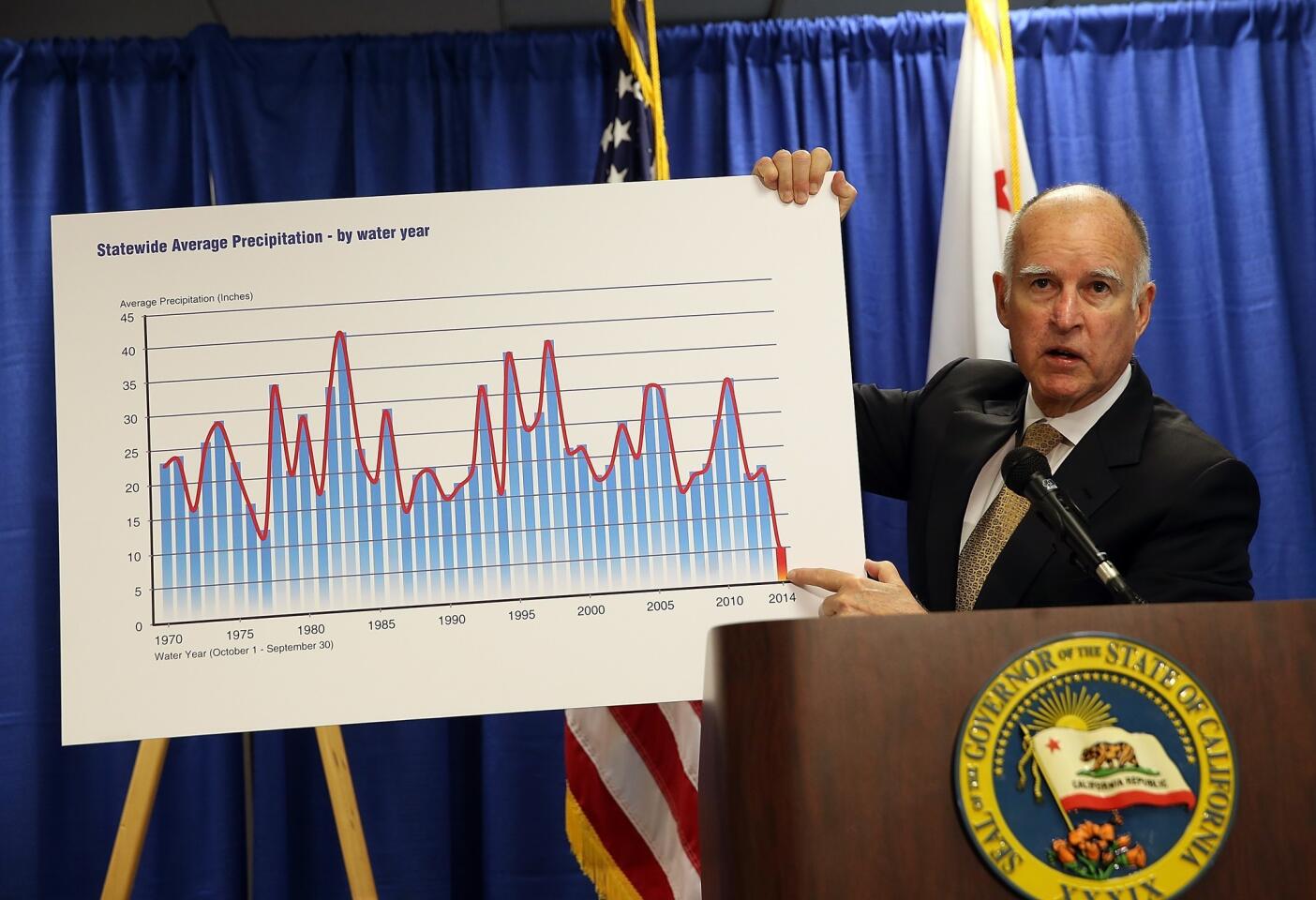
Another of Brown’s big-picture projects -- a now $25-billion proposal to ship water from the north to the south of the state -- is getting push-back from the delta region and conservationists.
The goal, according to the Sacramento Bee, is to “simultaneously improve wildlife habitat and stabilize water supplies from the estuary, a source of water for 25 million people and 3 million acres of farmland from San Jose to San Diego.”
The ambitious and expensive project envisions huge tunnels under the Sacramento-San Joaquin River Delta that would divert a portion of the water flow.
But increasingly, critics worry about the price tag of a project that, as state Sen. Lois Wolk (D-Davis) told The Times, “pits region against region”; they are urging a “more affordable, less divisive ... path forward.”
And the state of the state’s water remains on the front burner.
Amid California’s driest year on record, The Times wrote, the governor officially declared a drought emergency: “We ought to be ready for a long, continued, persistent effort to restrain our water use,” Brown said, adding that conservation efforts would be voluntary. (Justin Sullivan / Getty Images)
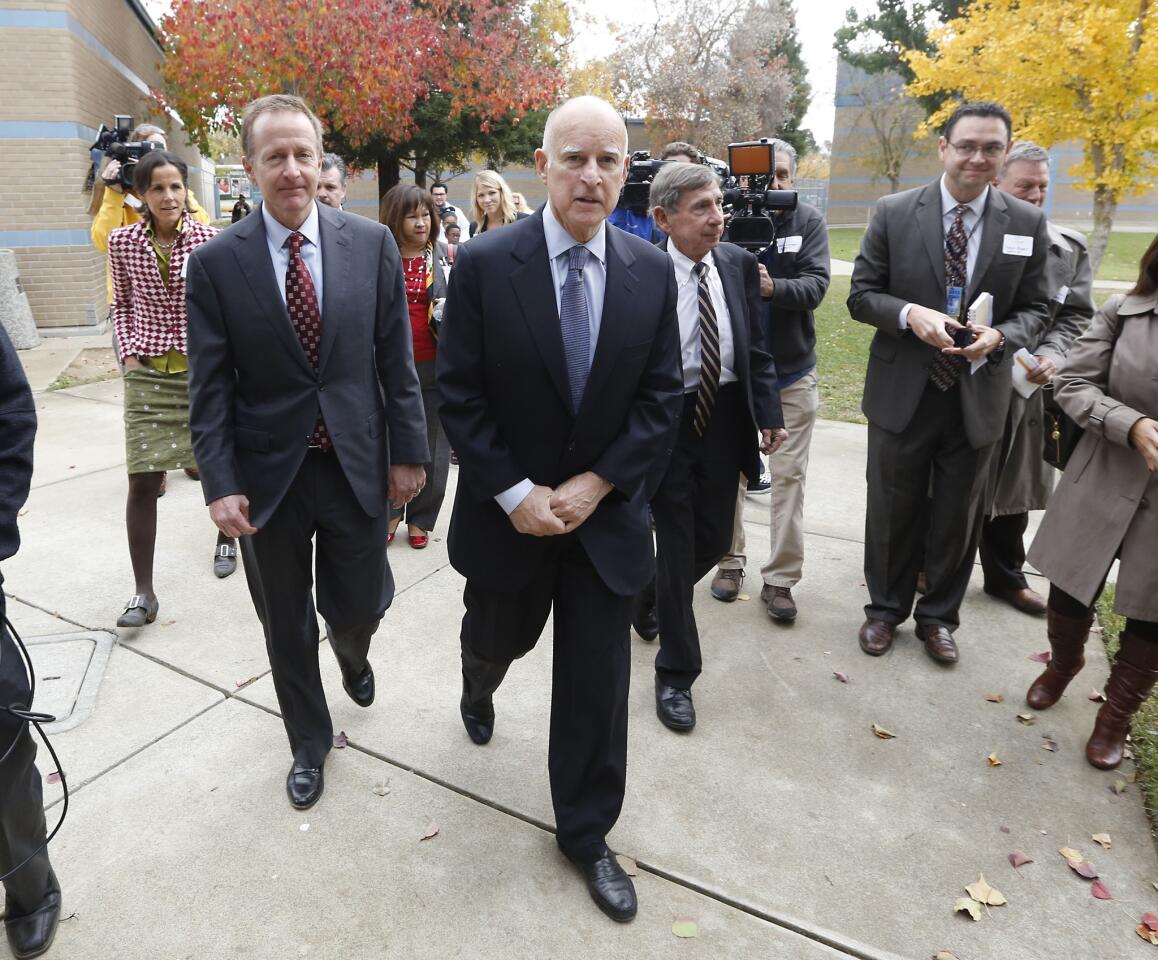
Gov. Jerry Brown gets credit for bringing annual state spending under control. But deficits and debt are different things.
In a “front-page reality check,” The Times pointed out last year that California “has accumulated a crushing load of debt for retiree pensions and healthcare, now totaling more than taxpayers spend each year on all state programs combined.”
Yes, and that “wall of debt” that Brown has been targeting is “just one of the fiscal hurdles the state must overcome,” warns The Times’ editorial board.
In his just-released budget outline, the governor proposes to repay billions of dollars and stash more in a reserve fund.
So, what’s ahead? Will he run again and confront these issues?
“I don’t jump into these things lightly, and that’s why I’ve not declared my intentions,” Brown told reporters late last year.
“But at the same time,” he said, “I am aware that in November of next year there will be an election, and I will make some decisions regarding that. I want to take the time that’s appropriate.” (Rich Pedroncelli / Associated Press)







